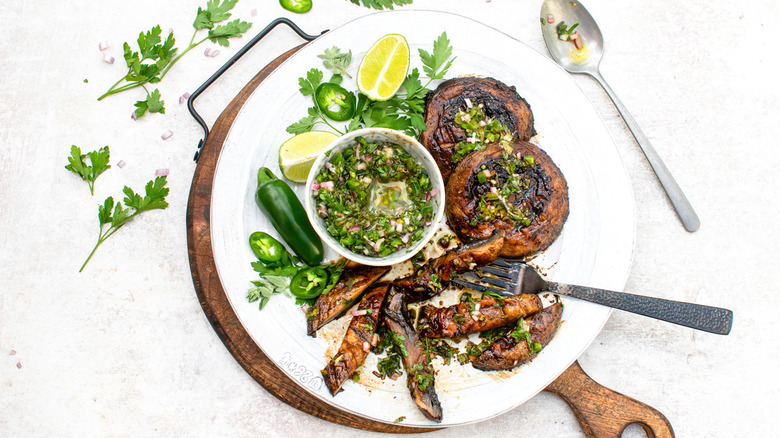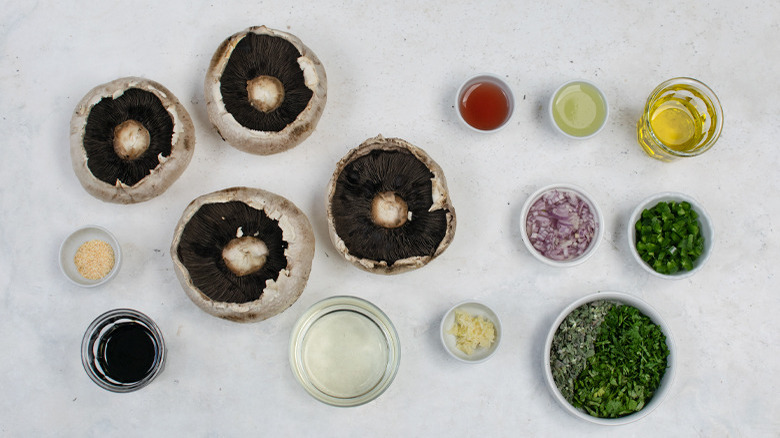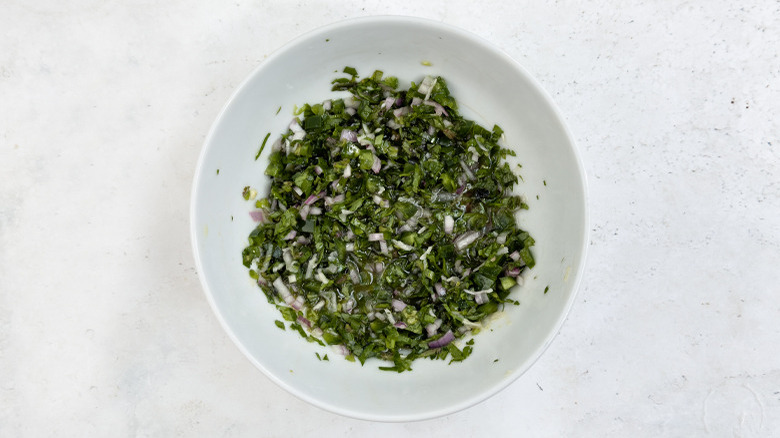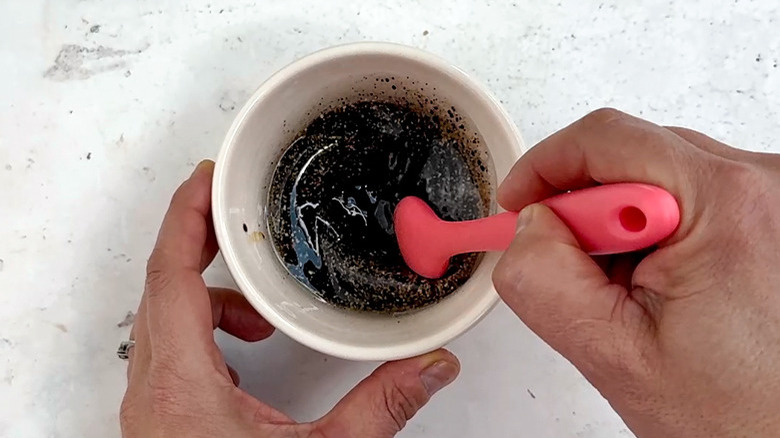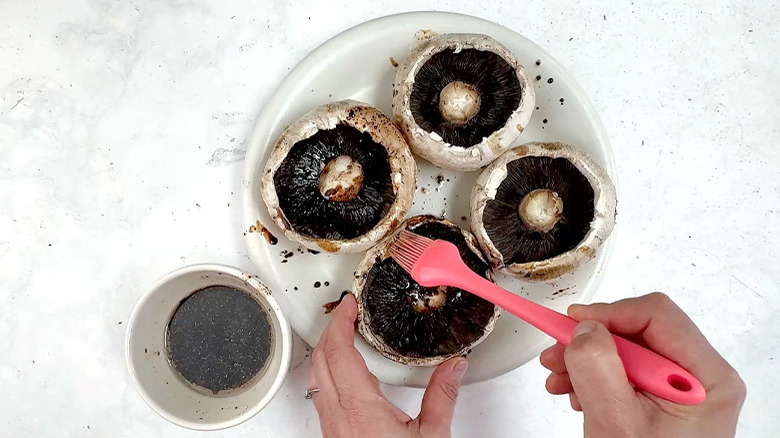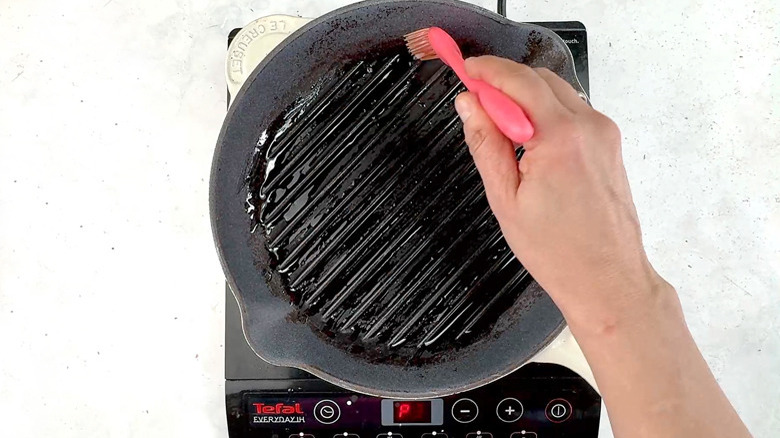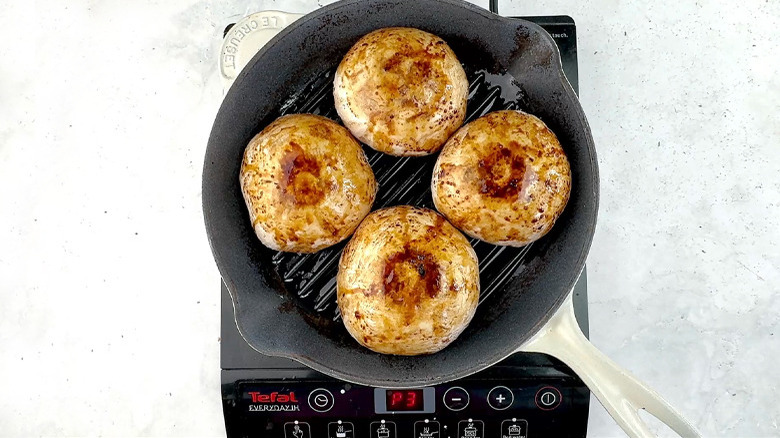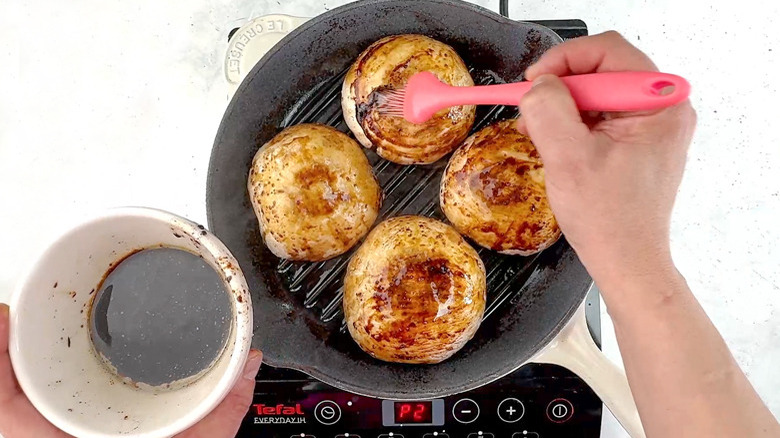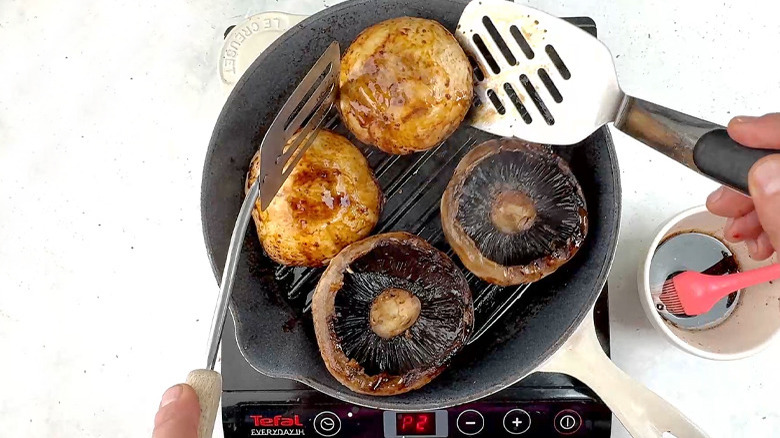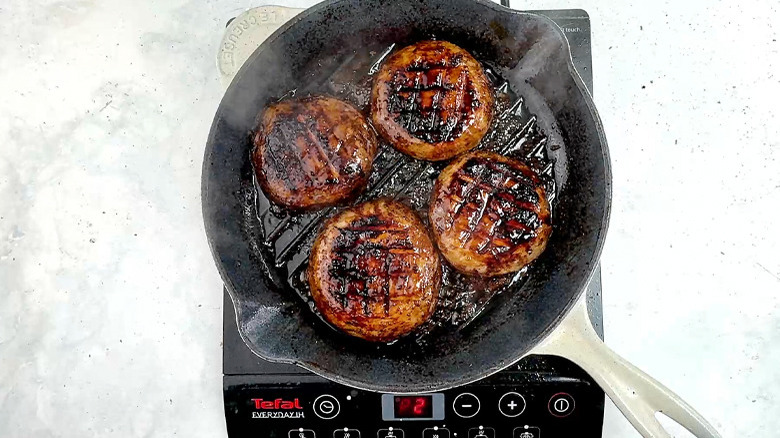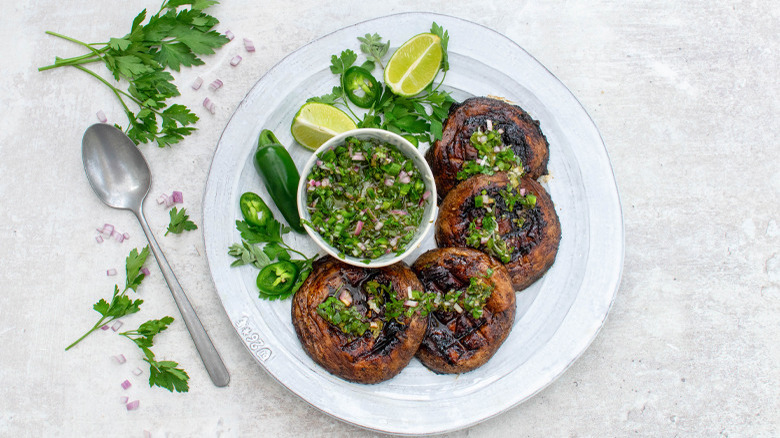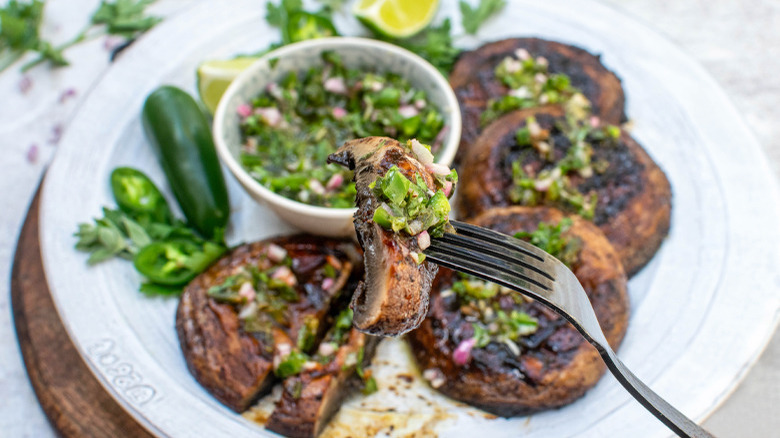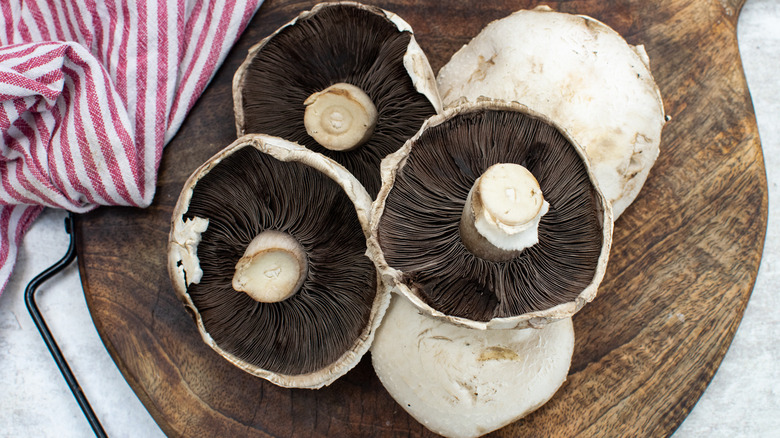Grilled Portobello Mushrooms With Jalapeño Chimichurri Recipe
Skip the steak and go meat-free with these juicy and tender grilled portobello mushrooms. Served with a bright and fresh jalapeño chimichurri sauce, these mushrooms make a meaty appetizer or light lunch that will delight vegetarians and meat-eaters alike. Zesty and tangy, the jalapeño chimichurri is drizzled all over the mushrooms before serving, providing the perfect contrast to the earthy, umami taste of the grilled portobellos.
This delicious dish from recipe developer Annabelle Randles is best eaten hot or warm and can be enjoyed on its own, or with a side of rice, other grains, or a potato salad. To enhance the flavor of the portobello mushrooms, Randles bastes them in a marinade made with oil, soy sauce, and garlic. The mushrooms are then grilled in a skillet, with more marinade being added as they cook. You could also fire up the BBQ and cook the mushrooms over an open fire.
Gather the ingredients for these grilled portobello mushrooms with jalapeño chimichurri
To make these grilled portobello mushrooms with jalapeño chimichurri, you will need some portobello mushrooms, olive oil, soy sauce, and garlic powder. For the chimichurri, you will need parsley, cilantro, shallots, oregano, jalapeño, extra-virgin olive oil, lime juice, red wine vinegar, and garlic.
Step 1: Make the jalapeño chimichurri
Make the jalapeño chimichurri: Mix all of the ingredients together and set aside.
Step 2: Make the mushroom marinade
Make mushroom the marinade: Mix together ¼ cup olive oil, soy sauce, and garlic powder.
Step 3: Brush the mushrooms with marinade
Brush the mushrooms all over with some of the marinade.
Step 4: Heat an oiled skillet
Brush a large skillet with olive oil and heat over medium heat.
Step 5: Cook the mushrooms
Place the mushrooms gill-side down in the pan.
Step 6: Brush on more marinade
Brush some more marinade on top of the mushrooms and grill until tender, about 4–5 minutes.
Step 7: Flip the mushrooms
Flip the mushrooms over and cook, top-sides down, until tender, about 2–3 minutes.
Step 8: Cook the mushrooms until tender
Brushing and cooking each side alternatively, cook the mushrooms until they are nicely browned and tender all over, about 4–7 minutes.
Step 9: Serve the mushrooms
Serve the mushrooms hot, topped with the jalapeño chimichurri.
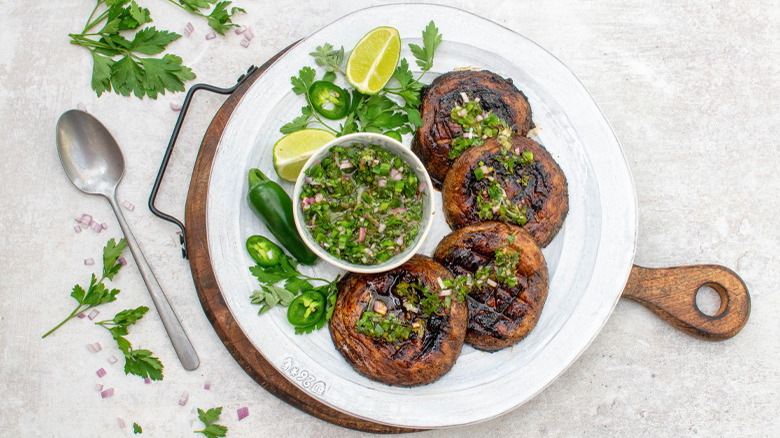
- For the jalapeño chimichurri
- 2 tablespoons finely chopped parsley
- 2 tablespoons finely chopped cilantro
- 2 tablespoons finely sliced shallots
- 1 tablespoon finely chopped oregano leaves
- 1 jalapeño, or to taste, seeds and stem removed and finely chopped
- 3 tablespoons extra-virgin olive oil, or to taste
- 2 tablespoons lime juice, or to taste
- 1 tablespoon red wine vinegar
- 1 garlic clove, grated
- For the mushrooms
- ¼ cup olive oil, plus extra to brush the pan
- 2 tablespoons soy sauce
- ½ teaspoon garlic powder
- 4 large portobello mushrooms, stems removed
- Make the jalapeño chimichurri: Mix all of the ingredients together and set aside.
- Make mushroom the marinade: Mix together ¼ cup olive oil, soy sauce, and garlic powder.
- Brush the mushrooms all over with some of the marinade.
- Brush a large skillet with olive oil and heat over medium heat.
- Place the mushrooms gill-side down in the pan.
- Brush some more marinade on top of the mushrooms and grill until tender, about 4–5 minutes.
- Flip the mushrooms over and cook, top-sides down, until tender, about 2–3 minutes.
- Brushing and cooking each side alternatively, cook the mushrooms until they are nicely browned and tender all over, about 4–7 minutes.
- Serve the mushrooms hot, topped with the jalapeño chimichurri.
What is chimichurri, and what are some other uses for the sauce?
Chimichurri is a punchy and vibrant green sauce originating from South America (mainly Argentina and Uruguay). At its simplest, it's made with finely chopped herbs, vinegar, garlic, oil, and red pepper flakes. With endless variations, including with ingredients such as onion, shallot, or citrus juice, chimichurri is a versatile condiment that can also be used as a marinade or dipping sauce. Don't hesitate to customize it by mixing in different herbs or using more or less oil to vary its consistency.
In South America, chimichurri is often served as an accompaniment for grilled meat (think juicy Argentinian or Brazilian steaks), but its bold, tangy flavor also pairs well with a wide variety of other foods when they're cooked with a simple seasoning of salt and pepper, including grilled fish or seafood such as cod or shrimp. Chimichurri is also delicious with grilled or roasted vegetables — try asparagus, zucchini, or eggplant. It makes a tasty condiment for grilled tofu, burgers, and halloumi, fried or scrambled eggs, and empanadas. Randles also likes to use any leftovers as dressing for potatoes, pasta, rice, or a grain salad. You can also drizzle chimichurri over steak or goat cheese pizza, as well as plain chicken or steak kebabs.
What are some tips for preparing and cooking portobello mushrooms?
Favored for their large shape, meaty texture, and rich, umami taste, portobello mushrooms are often cooked whole, whether that's grilled, baked, or stuffed. Each part of the mushroom is edible, including the large cap, dark gills, and lighter colored stem.
While portobello mushrooms found in grocery stores are most often cultivated rather than grown in the wild, they can still be dirty and do need a gentle clean to remove any soil. This can be done with a quick wash under the tap. Make sure that you pat the mushrooms dry and use a damp cloth or kitchen towel to remove any dirt before cooking them. As with the preparation of other mushrooms, it is best to avoid soaking portobellos in water to clean them as they will absorb too much water.
There is no need to peel portobello mushrooms before cooking them. Depending on how you intend to use the mushrooms, you might decide to spoon out some or all of the gills. For example, gills can take up too much space if you are making stuffed portobellos, and they can also release a dark liquid while cooking, which can look unappealing in certain dishes. Portobello stems are quite fibrous and might need to be trimmed. Still, make sure not to throw away any discards, as they can be finely chopped in other dishes or make flavorsome additions to homemade stock, broth or soup.
